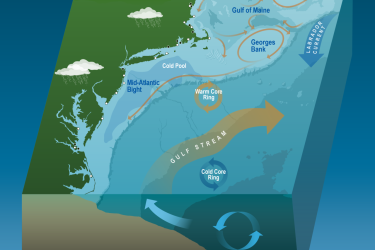East Coast fisheries managers will host a June 21-23 workshop with fishermen and other stakeholders to develop possible scenarios for how management could adapt to shifting fishing stocks and biological and economic changes coming with climate change.
Since late 2020 the East Coast Climate Change Scenario Planning Initiative, fishery scientists and managers have been “working collaboratively and engaging diverse fishery stakeholders to explore jurisdictional and governance issues related to climate change and shifting fishery stocks,” according to the Mid-Atlantic Fishery Management Council.
The initiative is a joint project of the Mid-Atlantic, New England and South Atlantic fishery management councils, the Atlantic States Marine Fisheries Commission and NMFS.
“Scenario planning is a tool that managers can use to test decisions or develop strategy in a context of uncontrollable and uncertain environmental, social, political, economic, or technical factors,” according to a solicitation this week from the Mid-Atlantic council. “It is a structured process for managers to explore and describe multiple plausible futures, termed ‘scenarios,’ and consider how to best adapt and respond to them.
“The next phase of this initiative will be a 2.5 day Scenario Creation Workshop, to be held in the Washington D.C. metro area on June 21-23, 2022. Through a series of conversations and exercises, participants will create a set of scenarios that describe how climate change might affect East Coast fisheries in the next 20 years.”
The process is designed to generate each scenario that describes “a different way in which changing oceanographic, biological, and social/economic conditions could combine to create future challenges and opportunities for East Coast fisheries.”
The initiative’s core team of staff from the management councils are soliciting applications from individuals who would like to attend the workshop. About 75 applicants will be selected to attend, with participation from commercial and recreational fishermen, commercial and recreational support services, environmental non-governmental organizations, scientists, fishery managers, other ocean users, and other interested parties.
“All travel and accommodation costs – pursuant to approved travel guidelines – will be covered for invited participants,” according to a notice from the New England council. “Attendees must be available to attend in-person.”
To apply for participation in the workshop, fill out an online application here by 11:59 p.m. on April 18.







